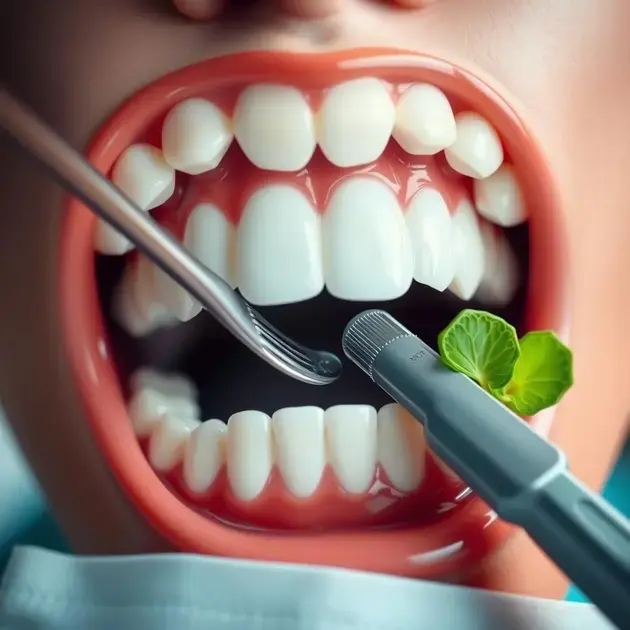Mouth cavities, also known as dental caries, are one of the most common health problems worldwide, affecting people of all ages. The key to understanding mouth cavities lies in recognizing the causes and implementing effective preventive measures. Recent studies show that while sugar intake is a major factor, factors like oral hygiene, saliva quality, and genetic predisposition also play crucial roles.
Prevention is undoubtedly better than cure when it comes to dental health. Regular brushing, flossing, reducing sugary snacks, and routine dental check-ups are fundamental strategies to prevent the onset of cavities. These simple habits can save individuals from the pain and expense associated with dental treatments, emphasizing the importance of early and consistent preventive care.

Understanding the Impact of Sugar on Mouth Cavities
Understanding the impact of sugar on mouth cavities is crucial for maintaining optimal oral health. Consuming sugary foods and drinks can lead to the growth of harmful bacteria in the mouth, which produce acids that attack the tooth enamel. Over time, this acid erosion can result in the formation of cavities. To minimize the impact of sugar on mouth cavities, it is important to limit the intake of sugary foods and beverages.
One way to reduce the impact of sugar on mouth cavities is to practice good oral hygiene. Brushing your teeth at least twice a day and flossing regularly can help remove plaque buildup and prevent cavities. Using a fluoride toothpaste can also be beneficial, as fluoride helps strengthen the enamel and protect against acid attacks. Additionally, rinsing your mouth with water after consuming sugary foods or drinks can help wash away some of the sugars and acids.
Another important factor to consider is the frequency of sugar consumption. Snacking on sugary foods throughout the day can expose your teeth to acids continuously, increasing the risk of cavities. Instead, try to consume sugary treats in moderation and during meal times to minimize the impact on your oral health.
Monitoring your sugar intake and practicing good oral hygiene are essential steps in preventing cavities caused by sugar. By being mindful of the impact of sugar on mouth cavities and taking proactive measures to protect your teeth, you can maintain a healthy and cavity-free smile.
References:
– MouthHealthy.org
– WebMD
The Role of Oral Hygiene in Preventing Dental Caries
Oral hygiene plays a significant role in preventing dental caries, also known as cavities. Maintaining good oral hygiene practices, such as brushing your teeth, flossing, and using mouthwash, can help remove plaque and bacteria from the teeth and gums. This, in turn, reduces the risk of tooth decay and cavities.
To effectively prevent dental caries, it is important to brush your teeth at least twice a day with fluoride toothpaste. Brushing helps remove food particles and plaque that can lead to cavities. It is also crucial to floss daily to clean between the teeth and along the gumline, where toothbrush bristles may not reach.
In addition to regular brushing and flossing, using an antimicrobial mouthwash can help kill bacteria in the mouth and reduce the risk of cavities. Mouthwash containing fluoride can also strengthen the enamel and protect against acid attacks. Visiting your dentist for regular check-ups and cleanings is another essential aspect of maintaining good oral hygiene and preventing dental caries.
By incorporating proper oral hygiene practices into your daily routine and scheduling regular dental appointments, you can effectively prevent dental caries and maintain a healthy smile. Remember, good oral hygiene is key to preventing cavities and ensuring optimal oral health.
References:
– MouthHealthy.org
– American Dental Association
Genetic Predisposition and Its Influence on Cavities
Genetic predisposition can play a role in an individual’s susceptibility to cavities. Some people may have genetic factors that make them more prone to developing cavities, regardless of their oral hygiene practices. Understanding the influence of genetic predisposition on cavities can help individuals take proactive steps to protect their oral health.
While genetics may predispose some individuals to cavities, it does not mean that cavities are inevitable. By maintaining good oral hygiene habits and following a cavity prevention routine, individuals can still reduce their risk of developing cavities. Regular dental check-ups, cleanings, and fluoride treatments can also help strengthen the enamel and prevent decay.
Individuals with a genetic predisposition to cavities may benefit from additional preventive measures, such as dental sealants or prescription fluoride treatments. Dental sealants can protect the chewing surfaces of the back teeth from food particles and bacteria that can cause cavities. Prescription fluoride treatments can help strengthen the enamel and make teeth more resistant to acid attacks.
It is essential for individuals with a genetic predisposition to cavities to be proactive about their oral health and work closely with their dentist to develop a personalized prevention plan. By understanding the influence of genetic factors on cavities and taking preventive measures, individuals can reduce their risk of dental decay and maintain a healthy smile.
References:
– MouthHealthy.org
– Journal of Clinical Periodontology

The Importance of Regular Dental Check-ups
Regular dental check-ups are crucial for maintaining good oral health. These appointments allow your dentist to assess your overall oral health, detect any issues early on, and provide necessary treatments. By visiting your dentist regularly, you can prevent the development of serious dental problems and save money in the long run.
During a dental check-up, your dentist will examine your teeth, gums, and mouth for any signs of decay, gum disease, or other issues. They may also perform a thorough cleaning to remove plaque and tartar buildup, which can help prevent cavities and gum disease. Additionally, regular check-ups often include X-rays to detect any underlying problems that may not be visible to the naked eye.
It is recommended to schedule dental check-ups at least twice a year, but some individuals may need to visit more frequently based on their oral health needs. Children, pregnant women, and individuals with certain medical conditions may require more frequent appointments to ensure optimal oral health.
By prioritizing regular dental check-ups, you are taking proactive steps to maintain a healthy smile and prevent dental issues before they escalate. Remember, prevention is always better than treatment when it comes to oral health.
How Diet Affects Oral Health
Your diet plays a significant role in your oral health. Consuming sugary and acidic foods and beverages can contribute to tooth decay and cavities. Bacteria in the mouth feed on sugars from the foods you eat, producing acids that erode tooth enamel and lead to decay.
In addition to sugary foods, starchy and sticky foods can also increase the risk of cavities. These foods tend to linger on the teeth, providing a breeding ground for bacteria to thrive. It is important to limit your intake of sugary and starchy foods and ensure you brush and floss regularly to remove any food particles trapped between your teeth.
On the other hand, a diet rich in nutrient-dense foods like fruits, vegetables, and dairy products can promote good oral health. These foods provide essential vitamins and minerals that support strong teeth and healthy gums. Drinking plenty of water also helps rinse away food particles and bacteria, reducing the risk of cavities and gum disease.
Remember, maintaining a balanced diet and practicing good oral hygiene habits are key components of a healthy smile. Making smart food choices can positively impact your oral health and overall well-being.
The Role of Fluoride in Preventing Cavities
Fluoride is a mineral that plays a crucial role in preventing cavities and maintaining strong teeth. It helps to protect the enamel, the outer layer of the teeth, from acid attacks that can lead to decay. Fluoride can also reverse early stages of tooth decay by remineralizing the enamel and preventing further damage.
Most toothpaste and mouthwash products contain fluoride, providing an easy and effective way to incorporate this mineral into your daily oral care routine. In addition to topical fluoride treatments, many communities add fluoride to their water supply as a public health measure to improve dental health among residents.
Regular exposure to fluoride, whether through toothpaste, mouthwash, or fluoridated water, can strengthen the teeth and make them more resistant to decay. This is particularly beneficial for children whose teeth are still developing and are more susceptible to cavities.
It is important to use fluoride-containing products as directed by your dentist and healthcare provider to reap the full benefits of this mineral. By incorporating fluoride into your oral care regimen, you can help prevent cavities and ensure a lifetime of healthy smiles.
Conclusion
In conclusion, regular dental check-ups are essential for maintaining optimal oral health. These appointments not only enable dentists to assess overall oral health and detect issues early on but also facilitate timely interventions to prevent serious dental problems. By prioritizing routine visits, individuals can proactively safeguard their smiles, avoid escalated dental issues, and save on long-term healthcare costs.
Furthermore, the impact of diet on oral health cannot be overstated. Consistent consumption of sugary, acidic, or sticky foods elevates the risk of tooth decay and cavities by creating favorable conditions for bacterial growth. Conversely, a diet rich in nutrient-dense foods like fruits, vegetables, and dairy products supports strong teeth and healthy gums. Coupled with regular brushing and flossing, smart dietary choices can significantly enhance oral health and overall well-being.
Lastly, fluoride plays a pivotal role in cavity prevention and enamel maintenance. Incorporating fluoride through toothpaste, mouthwash, or fluoridated water strengthens the teeth, making them more resistant to decay. This mineral not only protects enamel from acid attacks but also aids in remineralizing and reversing early stages of tooth decay. By following professional recommendations on fluoride use, individuals can effectively mitigate cavity risks and ensure a lifetime of healthy smiles.
